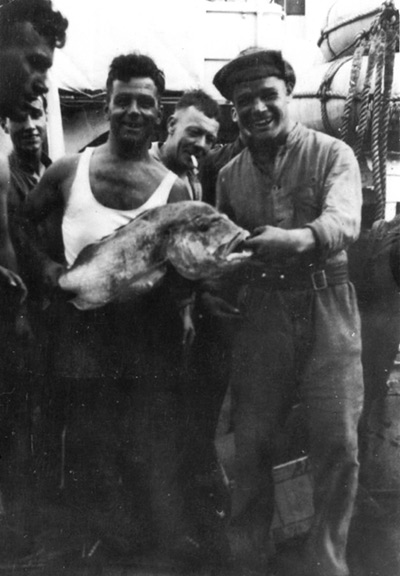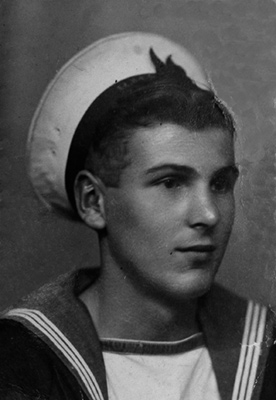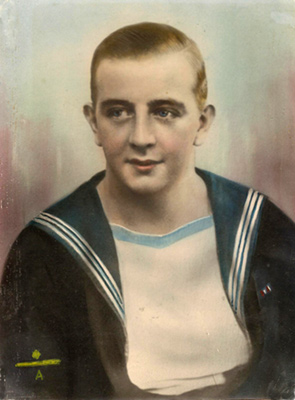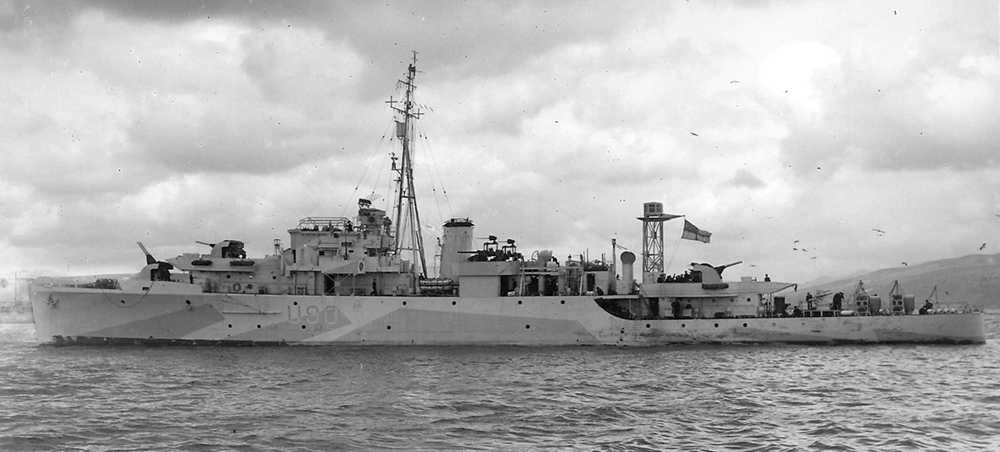Derek Shepherd (known to his shipmates as "Shep") was born on 2 March 1926 at
Basingstoke where his father owned a baker and grocery shop, A
H Shepherd and Sons. In November 1941 when he was 15 he went to
Reading with a friend to
try and join the Royal Navy. A marine sergeant lined up the volunteers
and told them to step forward if they were under age, so as not to waste the Navy's time.
Two or three of the lads stepped forward but Derek was big for his age,
stayed where he was and was accepted into the Navy. He was one of
sixteen HO only ratings
who joined Wishart at Gibraltar on the same day in
February 1942.

 Life on a V & W came as a shock to Shep. The "fresh water" on board
was brown and horrible, they put Andrew Liver Salts in it to clean
their teeth, and they often went hungry through lack of fresh food. On
one memorable occasion the skipper gave instructions that a depth
charge should be dropped when the Asdic showed a shoal of fish and
enough floated to the surface to feed the entire ship's company.
Life on a V & W came as a shock to Shep. The "fresh water" on board
was brown and horrible, they put Andrew Liver Salts in it to clean
their teeth, and they often went hungry through lack of fresh food. On
one memorable occasion the skipper gave instructions that a depth
charge should be dropped when the Asdic showed a shoal of fish and
enough floated to the surface to feed the entire ship's company.
They towed the USS Thomas Stone into Algiers after she was torpedoed on the 7 November 1942 during the landings in North Africa, Operation Torch.
They broke every wire in the ship trying to tow her and then found she
was too heavy and another destroyer had to come alongside Wishart to assist. Derek
was still an OD earning two shillings a day and the prize money he received
after the war was £3, as much as he earned in a month. He recalled with amusement hearing Lord Haw Haw broadcast from Berlin that HMS Wishart had been sunk but, as he put it, on going on deck he found his ship was still afloat!
Wishart was escorting a convoy 60 miles West of Oran when the Hunt Class destroyer, HMS Blean, was torpedoed by U-443 on 11
December 1942 and sank within four minutes. Her CO, Lt Norman J. Parker RN survived. Shep was a member of the
five man gun crew for the 12 pounder, the ineffective anti-aircraft
gun. They were the boat crew that manned the whaler to rescue survivors while Wishart
was chasing the U-boat. That was a terrible time. Men struggling
in the water, some with limbs missing, fighting for their lives, hanging onto the whaler's lifelines or trying
to scramble aboard. Eight
officers and 86 ratings were rescued plus 16 who died later and were sewn in
hammocks and buried at sea after an officer said a few words. Eighty nine of the ship's company were lost. A list of 91 of the men, mostly those who died, can be seen on Uboat.net.
In 2003 Shep wrote to Navy News
asking former shipmates to get in touch and as a result received a
letter from AB Jim Watson, C/JX351655 (right), one of the men rescued by HMS Wishart when Blean was torpedoed. Jim had been on Blean since she was first commissioned and his action station was on X-Gun at
the stern. He slept in the aft messdeck but he and one other rating were in the Galley when the
first torpedo struck. They had been sent to bring back the evening meal. All the others in his mess were killed.
Jim
had on an inflatable life jacket and made his way from the Galley
to the fo’c’sle and when the ship heeled over onto her port
side he scrambled up the sloping deck to the starboard rail and
slithered down the hull into the water. He clung by a rope loop
to the outside of a crowded Carley Float and then climbed up a
scrambling net hung over the side of Wishart.
He was pulled aboard, had a lighted “ciggie” thrust in his mouth, was
taken to the seamen's mess deck where the survivors were given scraps
of dry clothing by the lads and lots of tea and fell asleep. At Gib he
was put on a troopship to the Clyde arriving there on Christmas Eve and
reaching home for 14 days survivors' leave at midnight on Christmas Day.
Jim Watson wrote in his letter to Derek Shepherd:
"You are the first person from the Wishart
that I have come across since then, so when you find your old
shipmates, which I'm sure you will, please give them my everlasting
thanks for all they did for us".
Derek is now able to pass on Jim's thanks by publishing his letter on the web.
Blean
had the shortest career of any of the Hunts. The whole of her active
service was with the 58th Destroyer Division, based at Algiers,
escorting Torch convoys. She
was escorting Convoy MKF.4 when she was torpedoed by U-443 sixty miles
West of Oran. The first torpedo hit her on the starboard side. The
second torpedo struck forward on the starboard side. The Blean
was enveloped in a pall of smoke and rolled over onto her starboard
side and sank by the stern four minutes after the first torpedo struck.
On 23 February 1943
U-443 was sunk with all hands by HMS Bysender, HMS Bycester, HMS Lamberton and HMS Wheatland thirty miles north west of Algiers. Jim Watson spent the rest of the war in a sloop, HMS Woodcock, part of Capt F.J. Walker’s Second Support Group hunting down u-boats in the Atlantic. One of his shipmates on Woodcock was Jack Spencer, who was also a survivor from HMS Blean. In 2000 they met again to reminisce over a pint, the only other survivor Jim has met. Their children would not have been born had their fathers not been saved. Jim Watson is now 92.
Jim Watson (left) joined HMS Woodcock (above) after HMS Blean was sunk
Courtesy of Jim Watson
Derek Shepherd has fond memories of their first CO,
Cdr. Humphrey Gilbert Scott, RN,
"a good one, a three ringer", who would sit on his high stool on the
bridge, feet up, relaxed and called out changes of course as the bombs
fell all around. After each three weeks spell at sea he requested a
new assignment before they even entered harbour at Gib. Although
greatly respected and admired by the Crew they were not so keen on
going straight out again. His successor, an RNVR Lieutenant, was seen
as a comedown after Scott.
Derek remembered HMS Wishart
with Cdr H.G. Scott RN in command being escort leader for one of the
first through convoy from Gib to Alex Convoy, GTX.3, 22 June - 3 July 1943. They were bombed
so frequently they ran out of ammunition for the 4.7 inch guns and had
to fire star shells at German aircraft. They also ran out of Naval rum
and had to restock at Alex with a terrible substitute, which was
exchanged for the real thing on their return to Gib. But before then
came the landings on the south east coast of Sicily, Operation Husky,
when Wishart was an escort fior the second wave which left Alex on 10
Jukly and arrived off Augusta, Sicily, on 13 July 1943. He remembered
picking up parachutists from planes shot down that night by
friendly fire from the merchant ships while over flying the convoy.
When I spoke to Derek by phone he said it was mainly the little incidents which stuck in his mind. He
recalled how when escorting carriers to Malta they had to act as
"pickup boat" as one in ten of the planes flown off to reinforce the
defence of the "George Cross Island" would go in the "hoggin".
When the Italian Navy surrendered Wishart was
sent to Taranto and told to stop all ships from entering or leaving the
harbour. Their new CO tried to stop the fishing fleet from returning to
harbour after a night at sea but nobody understood Italian and they
could do nothing to stop the boats from entering harbour. All the crew
found this and the embarrassment it caused their CO very amusing
Shep left Wishart as an AB and was sent on an Asdic course at Gib before joining HMS Palomares, a merchant ship which was converted to a Radar Cruiser which directed aircraft during landings in Italy. When Palomares was mined at Anzio on 22 January 1944 Derek Shepherd returned to Britain and joined HMS Lancaster Castle, a new Castle Class corvette. She was part of the close escort for two Arctic Convoys to Murmansk in 1945.
----------------------------
Derek Shepherd was discharged from the Navy six months earlier than his
shipmates because he was a baker by trade and the country was short of
bread. He rejoined the family business but wanted to return to sea and
when the business was sold he joined the passenger liner Mauritania on the Atlantic crossing to New York as a patissiere and then switched to SS Andes
which he preferred as she was on the longer run to ports in South
America. He had married in 1947 and rather reluctantly gave up the sea
to see more of his two sons. For the rest of his working life he was a
pastry cook in a traditional pie shop in Basingstoke where he was born
and lived until his death on 11 September 2018 at the age of 92.

 HMS WISHART
HMS WISHART
 Life on a V & W came as a shock to Shep. The "fresh water" on board
was brown and horrible, they put Andrew Liver Salts in it to clean
their teeth, and they often went hungry through lack of fresh food. On
one memorable occasion the skipper gave instructions that a depth
charge should be dropped when the Asdic showed a shoal of fish and
enough floated to the surface to feed the entire ship's company.
Life on a V & W came as a shock to Shep. The "fresh water" on board
was brown and horrible, they put Andrew Liver Salts in it to clean
their teeth, and they often went hungry through lack of fresh food. On
one memorable occasion the skipper gave instructions that a depth
charge should be dropped when the Asdic showed a shoal of fish and
enough floated to the surface to feed the entire ship's company.
